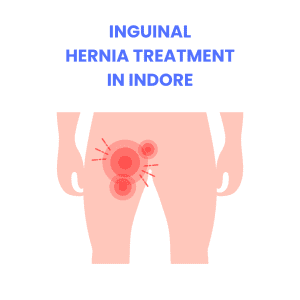Inguinal Hernia Treatment in Indore

What is an Inguinal Hernia?
A hernia occurs when tissue from one body cavity protrudes through a tear in the muscular wall into another cavity. The most common type is the inguinal hernia, which occurs when abdominal tissue, such as fat or a loop of intestine, pushes through a hole in the lower abdominal wall. This area is between the groin and the abdomen.
Inguinal hernias develop in the inguinal canal, which extends from each side of the pelvis to the genitals. They are also known as groin hernias (since “inguinal” refers to the groin). While inguinal hernias are the most common type, there are other types as well. Femoral hernias, for example, occur in the smaller femoral canal located below the inguinal canal and are less common.
What's the Difference Between a Direct Inguinal Hernia and an Indirect Inguinal Hernia?
An inguinal hernia can vary in seriousness based on its type and progression:
Direct Inguinal Hernia: This type occurs when abdominal tissue breaches the wall of the inguinal canal directly. It often develops in adults due to weakened abdominal muscles and prolonged pressure on the muscle wall.
Indirect Inguinal Hernia: An indirect inguinal hernia enters the inguinal canal from above, typically due to a congenital defect where the canal fails to fully close during fetal development.
While hernias themselves are not inherently life-threatening, they can lead to significant complications. Hernias tend to worsen over time as the opening in the muscle wall expands and weakens, allowing more tissue to protrude. There is an increased risk of tissue becoming trapped, which can cause pain and, in severe cases, complications such as intestinal obstruction or strangulation where the blood supply to the trapped tissue is compromised. Immediate medical attention is necessary in such cases.
What are the Symptoms of an Inguinal Hernia?


Symptoms of inguinal hernia may include:
- A bulge on either side of your pubic bone in the groin area, which may extend into your labia or scrotum.
- Feeling of heaviness or pressure in the groin.
- Pain in the groin, especially when stooping, lifting, coughing, or bending over.
- Burning or tingling sensation that may radiate down your leg or through your pelvis.
What is the Main Cause of Inguinal Hernia?
Causes of inguinal hernias can include:
- A congenital opening or weak spot present from birth.
- Variations in the tensile strength of connective tissue (collagen).
- Weakness or gaps left from previous abdominal surgeries.
- Persistent sneezing or coughing.
- Long-term straining during urination or defecation.
- Regular intense physical activity or manual labor.
- Multiple pregnancies and years of childbirth.
- Jobs requiring prolonged standing.
- Internal strain due to chronic obesity.
- Natural aging and degeneration of tissues.
FAQ
Certainly, a specialist in treating inguinal hernias can conduct a comprehensive evaluation of your condition. They possess the expertise to assess the severity of the hernia, recommend optimal treatment options available in Indore, and address any questions or concerns you may have.
You can consult with Doctor Pranav Mandovra for umbilical hernia treatment in Indore
To locate a specialist for inguinal hernia surgery in Indore, you can seek recommendations from your primary care physician, consult online directories of doctors and hospitals, or ask for referrals from friends or family members who have undergone hernia surgery. Additionally, conducting online research and reading patient reviews can aid in finding a suitable specialist in your area.
The cost of inguinal hernia surgery in Indore can fluctuate based on several factors such as the hospital or clinic chosen, surgeon fees, the type of surgery performed, and any additional necessary tests or medications. To get a clear idea of expenses, it’s advisable to consult with multiple healthcare providers or hospitals for cost estimates and details on what the overall price covers. Additionally, health insurance coverage can impact out-of-pocket costs for the surgery.
The success rate of inguinal hernia surgery in Indore may vary depending on factors such as the surgeon’s expertise, the surgical technique employed, and individual patient characteristics. For specific information tailored to your situation, it is recommended to discuss this question directly with your surgeon, who can provide insights based on their experience and outcomes.
